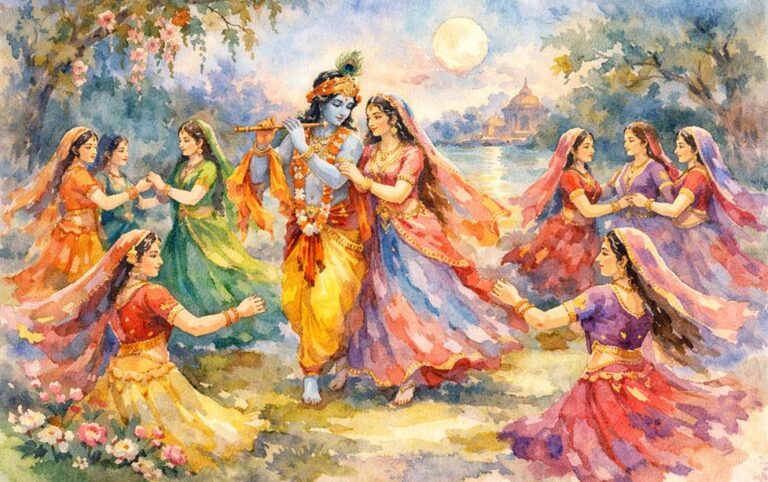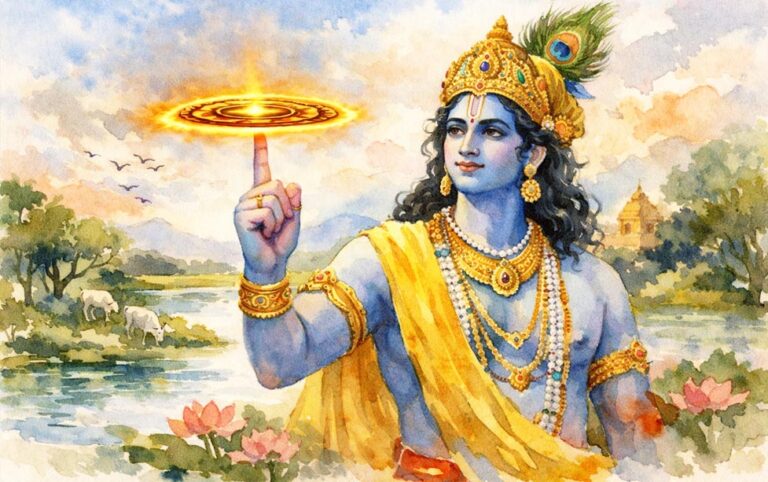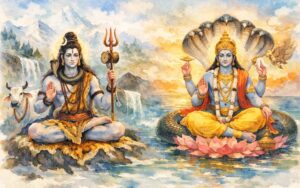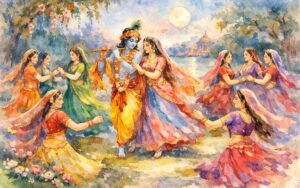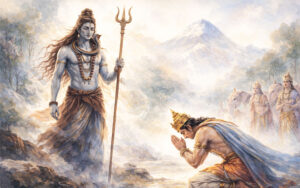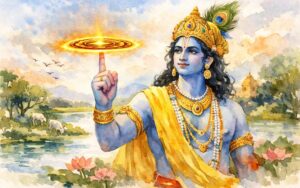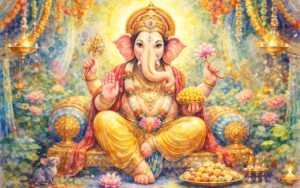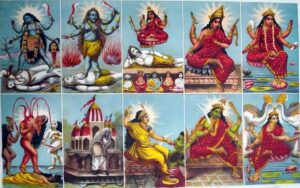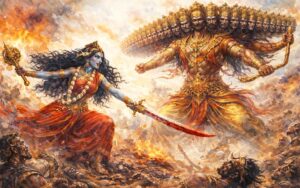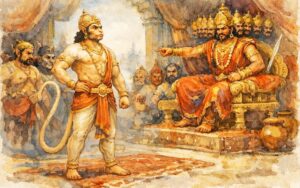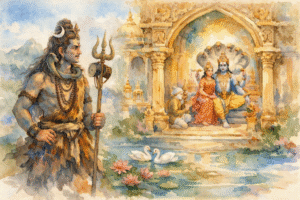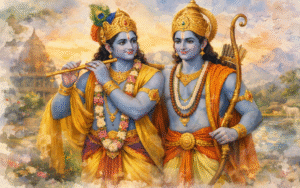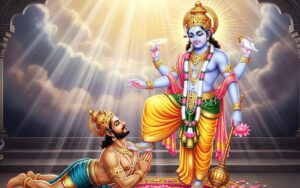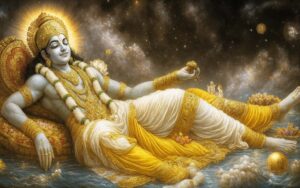

Narada Muni is a prominent sage in Hindu tradition and is known for his musical talents and wisdom. He is also considered to be the messenger of the gods and is often depicted as a wandering ascetic, traveling throughout the universe.

Characters in the story:
Narada Muni: Narada Muni is a divine sage and a devotee of Lord Vishnu. He is known for his wisdom, musical talents, and his role as a messenger and mediator between the gods and humans.
![]()
King Pracinabarhi: King Pracinabarhi is a prominent figure in Hindu philosophy who is best known for his encounter with the sage Narada and his pursuit of the ultimate truth. is often depicted with four heads, each representing a different Veda.
![]()
Valmiki: Valmiki is a revered ancient sage and author of the Hindu epic Ramayana. He is considered as the adi-kavi, the first poet or the “primordial poet” in Sanskrit literature.dance, with a third eye, a serpent around his neck, and a trident in his hand.
![]()
Vyasadeva: Vyasadeva is a revered sage and author of many ancient Hindu scriptures, including the Mahabharata and the Vedas. He is considered to be one of the most important figures in Hinduism and a key contributor to its philosophical and spiritual traditions.
Narada Muni is said to have imparted his teachings to various kings and sages. Here are three of those stories:
![]()
King Pracinabarhi:
Narada Muni taught King Pracinabarhi the importance of performing one’s duties without attachment and how to attain liberation from the cycle of birth and death.
King Pracinabarhi was a powerful and wealthy ruler who was engrossed in worldly pleasures and material pursuits. However, he was approached by Narada Muni, who advised him on the principles of dharma and the path to spiritual liberation.
Narada Muni taught King Pracinabarhi that the ultimate goal of life is to attain liberation from the cycle of birth and death, which is achieved by performing one’s duties without attachment. According to Hindu philosophy, the soul is eternal and is trapped in the cycle of birth and death due to its attachment to material desires and actions.
Narada Muni emphasized the importance of performing one’s duties without attachment, which means that one should focus on fulfilling their responsibilities without being motivated by personal desires or expectations. This helps to purify the mind and free the soul from the cycle of birth and death.
King Pracinabarhi was inspired by Narada Muni’s teachings and renounced his materialistic lifestyle to pursue the path of spiritual enlightenment. He eventually attained liberation from the cycle of birth and death and became a great devotee of the Lord.
In essence, Narada Muni’s teachings to King Pracinabarhi highlight the importance of detachment from worldly desires and the performance of one’s duties in a selfless manner. This is a key principle in Hindu philosophy and is believed to be essential for spiritual growth and liberation.
![]()
Valmiki:
Narada Muni inspired the sage Valmiki to write the Ramayana, one of the most famous Hindu epics.
In Hindu scriptures, Valmiki is a revered sage who is known for his great literary works and spiritual teachings. He is most famous for writing the Ramayana, one of the most important and widely read Hindu epics. The story of the Ramayana tells the tale of Lord Rama, an incarnation of Lord Vishnu, and his quest to rescue his wife Sita from the demon king Ravana.
According to Hindu legend, Valmiki was not always a sage. He was once a highway robber who preyed on travelers and traders. However, his life was transformed when he encountered Narada Muni, who inspired him to abandon his criminal ways and devote himself to spiritual pursuits.
Narada Muni taught Valmiki the principles of dharma and the importance of leading a virtuous life. He also told him the story of Lord Rama and inspired him to write the Ramayana. Valmiki was so moved by the story and its message of righteousness and devotion that he decided to put it into writing.
Under Narada Muni’s guidance, Valmiki composed the Ramayana in Sanskrit, which became one of the most important works of Hindu literature. The epic has had a profound impact on Indian culture and has been translated into many languages.
Narada Muni’s inspiration and guidance to Valmiki demonstrates the power of spiritual teachings and how they can transform a person’s life. The story also highlights the importance of literature and storytelling in conveying spiritual messages and inspiring people towards a virtuous life.
![]()
Vyasadeva:
Narada Muni encouraged Vyasadeva, the author of the Mahabharata and other important Hindu scriptures, to write the Srimad Bhagavatam, which is considered to be one of the most important texts in Hinduism.
Vyasadeva is considered to be one of the most important figures in Hinduism as he is credited with the authorship of several important texts such as the Mahabharata, the Vedas, and the Puranas. It is believed that he compiled and edited the Vedic scriptures, which contain the teachings and rituals of Hinduism.
According to Hindu writings, Narada Muni played a significant role in encouraging Vyasadeva to write the Srimad Bhagavatam, one of the most important and revered texts in Hinduism. Narada Muni recognized Vyasadeva’s potential and advised him to write a text that would present the philosophy of bhakti yoga, which emphasizes the path of devotion and love for the divine.
Vyasadeva, initially hesitant to undertake such a task, was inspired by Narada Muni’s encouragement and began to write the Srimad Bhagavatam. The text comprises of 18,000 verses and contains the teachings of various sages and saints, including the life and teachings of Lord Krishna, one of the most important deities in Hinduism.
The Srimad Bhagavatam is considered to be a text of immense spiritual significance, providing deep insights into the nature of reality, the purpose of life, and the path to spiritual liberation. It presents a holistic view of the universe, emphasizing the interconnectedness of all living beings and the importance of living a life of virtue and compassion.
In essence, Narada Muni’s encouragement to Vyasadeva to write the Srimad Bhagavatam highlights the importance of the dissemination of spiritual knowledge and the role of enlightened sages and teachers in guiding individuals towards spiritual growth and liberation. The text remains a key source of inspiration and guidance for millions of Hindus around the world.
Overall, Narada Muni’s teachings emphasize the importance of developing love and devotion for the divine, performing one’s duties without attachment, and living a life of righteousness and compassion.





